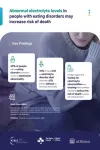(Press-News.org) Macquarie University researchers have discovered new information about how oral cancer cells may block the body's immune response. This could lead to better treatments for this aggressive disease.
Their research, published in the Journal of Oral Biosciences this month, looked at protein interactions in oral cancer cells that might stop our immune cells from attacking these tumours.
Oral cancer is the sixth most common cancer in Australia and the most common in India. Advanced forms of oral cancer are hard to treat, with patients typically surviving less than 12 months.
Lead author Dr Rajdeep Chakraborty from Applied Biosciences at Macquarie University says the study offers important clues about how oral cancer avoids the immune system.
“We thought there might be proteins in oral cancer cells working together to reduce immune cell attack,” Dr Chakraborty says.
Dr Chakraborty is principal investigator of the project, and is also a dentoalveolar surgeon and a Macquarie University PhD graduate.
Resistant to treatment
Oral cancer includes cancers of the lips, tongue, cheeks, mouth, palate, sinuses, and throat. Risk factors include tobacco use, heavy alcohol use, and HPV infection.
Early detection greatly improves survival rates for oral cancer. However, advanced disease remains very difficult to treat effectively.
Immunotherapy, which aims to boost the body's natural defences against cancer, has shown promise in some cancers but has had limited success in oral cancer. This new research may help explain why and point to new approaches.
The research focused on a protein called ‘signal transducer and activator of transcription 3’ – shortened to STAT3, which helps oral cancer cells grow. The team used advanced proteomic techniques to see which other proteins STAT3 interacts with in oral cancer cells.
“Our findings suggest that STAT3 and its protein partners are possibly acting as a confounder, and camouflaging cancer cells from being targeted during anti-cancer treatment in oral cancer.”
3D Cancer model
Dr Chakraborty developed a new three-dimensional cancer model for this research, which is now patented.
“The three-dimensional cancer model I developed puts cancer cells together with the immune cells rather than using mouse models that often don’t translate to human research.
“Human oral tissue cells are taken and prepared in such a way that the immune cells interact with oral cancer cells simultaneously to mimic tumour behaviour.”
Researchers then used mass spectrometry on the 3D models to identify the proteins interacting with STAT3.
The researchers found that STAT3 was much higher in all oral cancer cell types studied compared to normal oral cells.
They also found a protein called epidermal growth factor receptor (EGFR) was closely linked to STAT3 in oral cancer cells, and several other proteins that interacted with STAT3 were involved in controlling the immune system, including some known to suppress it.
Their analysis showed STAT3 and its partner proteins may be involved in pathways that help cancer avoid the immune system.
New treatment options
Dr Chakraborty says the research opens new possibilities for oral cancer treatment, particularly addressing drug resistance.
The team is now exploring combinations of treatments such as combining STAT3 monoclonal or engineered antibodies with EGFR treatment.
“Initial phase one and phase two reports have shown this to be working,” Dr Chakraborty says.
"This study reveals potential new drug targets that could help boost the immune response against oral cancer cells," he says.
The findings may also explain why some oral cancers become resistant to existing immunotherapy treatments.
Associate Professor Fei Liu, from the School of Natural Sciences at Macquarie University, is a chemist interested in precision therapeutics targeting cancer mechanisms and a collaborator on the research.
She says the team used a range of techniques in this study, including 3D cell culture, proteomics, and bioinformatics analysis.
“This multi-pronged approach allowed researchers to examine potentially unanticipated protein interactions in a model that may better mimic the environment of real tumours,” says Associate Professor Liu.
Dr Chakraborty says more research is needed to confirm the results and develop potential therapies.
“This is an important first step, but we now need to confirm these protein interactions and see if targeting them can boost anti-tumour immune responses,” he says.
Drug resistance
“Our preliminary data could shed light on why aggressive oral cancers often become resistant to cetuximab, one of the main FDA-approved targeted therapies,” Dr Chakraborty says.
(Cetuximab is a monoclonal antibody that targets EGFR, one of the key proteins identified in this study as interacting with STAT3).
“We hope this research will lead to new drug development and provide hope for oral cancer patients - particularly those with aggressive oral cancers that currently have very poor prognosis,” Dr Chakraborty says.
END
New research shows how oral cancer cells avoid immune system
2024-09-17
ELSE PRESS RELEASES FROM THIS DATE:
Abnormal electrolyte levels in people with eating disorders may increase risk of death, poor health outcomes
2024-09-17
Ottawa, ON, September 17, 2024 – A new study published in The Lancet Psychiatry found that 32% of individuals with an eating disorder had abnormal electrolyte levels, which were associated with a higher risk of death from any cause.
The study, led by researchers at ICES and The Ottawa Hospital, found that electrolyte abnormalities were also linked to the development of other serious health conditions, including chronic kidney disease, bone fracture, bowel obstruction, and acute kidney injury.
This is one of the first large, population-based studies to identify an important risk factor for mortality and poor health outcomes in individuals ...
No major concerns about risks to offspring for would-be dads taking epilepsy meds
2024-09-17
Would-be dads taking drugs to stop their epilepsy seizures—and valproate in particular—should be largely reassured that the available evidence on the developmental risks to their offspring doesn’t justify any major concerns, concludes a systematic review of relevant studies published online in the Journal of Neurology Neurosurgery & Psychiatry.
The available evidence is scarce and inconsistent, but most studies indicate no heightened risk, the findings show, casting doubt on the stance taken by the UK drugs regulator, the MHRA, in particular, say ...
Fifth of GPs using AI despite lack of guidance or clear work policies, UK survey suggests
2024-09-17
A fifth of family doctors (GPs) seem to have readily incorporated AI into their clinical practice, despite a lack of any formal guidance or clear work policies on the use of these tools, suggest the findings of an online UK-wide snapshot survey, published in the open access journal BMJ Health & Care Informatics.
Doctors and medical trainees need to be fully informed about the pros and cons of AI, especially because of the inherent risks of inaccuracies (‘hallucinations’), algorithmic biases, and the potential to compromise patient privacy, ...
Novel triplet regimen yields promising response in advanced-phase chronic myeloid leukemia
2024-09-17
HOUSTON ― According to researchers at The University of Texas MD Anderson Cancer Center, 80% of patients with previously untreated or relapsed/refractory advanced-phase chronic myeloid leukemia (CML) – including both accelerated or myeloid blast phases of the disease – or Philadelphia chromosome-positive acute myeloid leukemia (AML) achieved a bone marrow remission when treated with a novel combination of decitabine, venetoclax and ponatinib.
Findings from the Phase II clinical trial, published today in The Lancet Haematology, represent an important step forward for patients ...
‘Scuba-diving’ lizards use bubble to breathe underwater and avoid predators
2024-09-17
BINGHAMTON, N.Y. -- Presenting the world’s smallest (and scrappiest) scuba diver: A species of semi-aquatic lizard produces a special bubble over its nostrils to breathe underwater and avoid predators, according to new research from Binghamton University, State University of New York.
Lindsey Swerk, an assistant research professor of biological sciences at Binghamton University, studies water anoles, a type of semi-aquatic lizard found in the tropical forests of southern Costa Rica. She had previously documented the lizards using a bubble underwater. When these lizards feel threatened by a predator, ...
USC launches large-scale nationwide study of type 1 diabetes and brain development
2024-09-17
About half of adults with type 1 diabetes face significant cognitive impairment, including problems with working memory and executive function that affect day-to-day thinking. But less is known about how the condition affects children during a window of time known to be critical for healthy brain development.
A new large-scale longitudinal study, led by the Keck School of Medicine of USC, will unite 12 research centers across the United States to explore that important question. Researchers will collaborate to recruit a large, diverse group of children newly diagnosed with diabetes, taking a sweeping look at the environmental, lifestyle, ...
Ancestry-specific genetic variants linked to multiple sclerosis risk, new study shows
2024-09-17
A landmark study has uncovered novel ancestry-specific genetic variants linked to multiple sclerosis (MS), offering new insights that could reshape treatment approaches for diverse populations affected by the disease.1 The research, presented today at ECTRIMS 2024, is the result of efforts by the Alliance for Research in Hispanic MS (ARHMS) Consortium and is the first large-scale study to identify ancestry-specific genetic effects for MS risk.
In a comprehensive analysis of over 7,000 individuals from self-reported Hispanic (n=4,313; 2,201 MS, 2,112 controls) and African American (n=3,085; 1,584 MS, 1,501 controls) backgrounds, researchers discovered ...
Early high-efficacy treatment significantly reduces long-term disability in children with multiple sclerosis, new study finds
2024-09-17
New research presented today at ECTRIMS 2024 reveals that initiating monoclonal antibody therapy during childhood, rather than delaying treatment until early adulthood, significantly reduces long-term disability in multiple sclerosis (MS) patients.1
The study, which utilised data from the French MS Registry, Italian MS Register, and the global MSBase Registry, analysed the outcomes of 282 patients with paediatric-onset MS who began experiencing symptoms before the age of 18 years. Patients were divided into two groups based on when they initiated monoclonal antibody treatment: either ...
Terasaki Institute CEO Dr. Ali Khademhosseini awarded the AIChE’s 2024 Andreas Acrivos Professional Progress
2024-09-17
Dr. Ali Khademhosseini, Ph.D., CEO and Director of the Terasaki Institute for Biomedical Innovation (TIBI), is honored with the 2024 Andreas Acrivos Award for Professional Progress in Chemical Engineering by the American Institute of Chemical Engineers (AIChE). This distinguished honor recognizes outstanding progress in the field of chemical engineering.
Named after Dr. Andreas Acrivos, Albert Einstein Professor of Science and Engineering, emeritus at the City College of New York, whose pioneering work in fluid ...
Slow-moving landslides a growing, but ignored, threat to mountain communities
2024-09-17
American Geophysical Union
17 September 2024
AGU Release 24-33
For Immediate Release
This press release is available online at: https://news.agu.org/press-release/slow-landslides-growing-threat-mountain-communities/
Slow-moving landslides a growing, but ignored, threat to mountain communities
Urban growth, climate change, and flood risk at lower elevations can push people to live on steeper, more dangerous terrain
AGU press contact:
Rebecca Dzombak, news@agu.org (UTC-4 hours)
Potsdam press contact:
Stefanie Mikulla, University of Potsdam, presse@uni-potsdam.de (UTC+2 hours)
Researcher contact:
Joaquin Vicente Ferrer, ...



